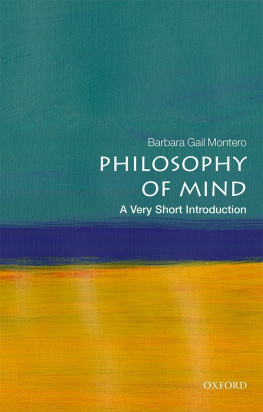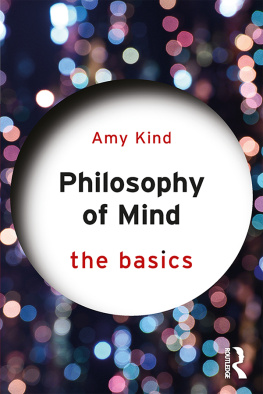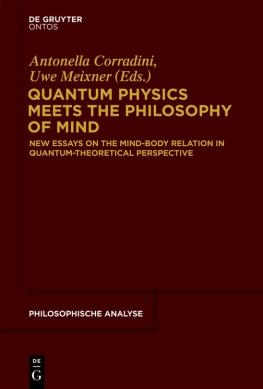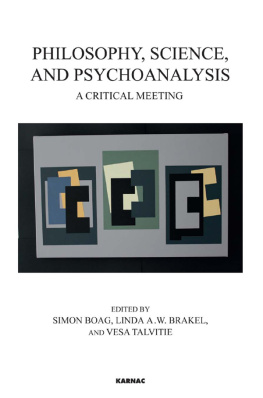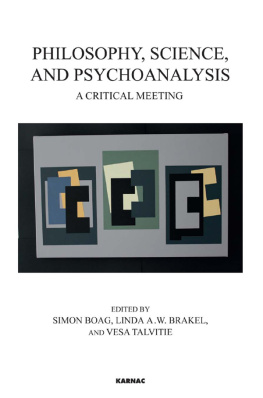The Ontology of Psychology
In this volume Brakel raises questions about conventions in the study of mind in three disciplinespsychoanalysis, philosophy of mind, and experimental philosophy. She illuminates new understandings of the mind through interdisciplinary challenges to views long accepted.
Here she proposes a view of psychoanalysis as a treatment that owes its successes largely to its biological naturebiological in its capacity to best approximate the extinction of problems arising owing to aversive conditioning. She also discusses whether the mental can have any real ontological standing, advancing a new form of reductive physicalismdiachronic conjunctive token physicalism (DiCoToP)which not only provides an understanding of mind/brain properties synchronically but can also be sufficient to address human-sized epistemological considerations that require a diachronic view. She then notes the positive implications of her account for psychiatry and psychoanalysis. Finally, she investigates the uses and abuses of consistency, both in method and content, in the several domains of interest: empirical research, psychoanalysis, thought experiments, and experimental philosophy.
In essence, Brakel articulates different sets of challenges pertaining to: (a) ancient dilemmas such as the mind/body problem; (b) long-standing debates about the nature of therapeutic action in psychoanalysis; and (c) new core questions arising in the relatively young discipline of experimental philosophy.
Linda A.W. Brakel is an adjunct associate professor in the Department of Psychiatry at the University of Michigan Medical School, a faculty research associate in the Department of Philosophy at the University of Michigan, and a faculty member of the Michigan Psychoanalytic Institute.
The Ontology of Psychology
Questioning Foundations in the Philosophy of Mind
Linda A.W. Brakel
First published 2013
by Routledge
711 Third Avenue, New York, NY 10017
Simultaneously published in the UK
by Routledge
2 Park Square, Milton Park, Abingdon, Oxon OX14 4RN
Routledge is an imprint of the Taylor & Francis Group, an informa business
2013 Taylor & Francis
The right of Linda A.W. Brakel to be identified as author of this work has been asserted by her in accordance with sections 77 and 78 of the Copyright, Designs and Patents Act 1988.
All rights reserved. No part of this book may be reprinted or reproduced or utilized in any form or by any electronic, mechanical, or other means, now known or hereafter invented, including photocopying and recording, or in any information storage or retrieval system, without permission in writing from the publishers.
Trademark Notice: Product or corporate names may be trademarks or registered trademarks, and are used only for identification and explanation without intent to infringe.
Library of Congress Cataloging-in-Publication Data
Brakel, Linda A. W.
The ontology of psychology: questioning foundations in the philosophy of mind / by Linda A.W. Brakel. 1 [edition].
pages cm. (Routledge studies in contemporary philosophy; 52)
Includes bibliographical references and index.
1. Psychoanalysis and philosophy. 2. Psychology and philosophy. 3. Ontology. I. Title.
BF175.4.P45B727 2013
150.1dc23
2013002679
ISBN: 978-0-415-63562-2 (hbk)
ISBN: 978-0-203-09248-4 (ebk)
Typeset in Sabon
by Apex CoVantage, LLC
Contents
This is an academic book, one published in the philosophy division of Routledge. I am proud of its placement here; I sought it, and, indeed, for the great majority of the book, I intend to adhere to the standard format and content befitting such an endeavor. However, because I believe my best (and rather) unique contributions can be made only as an interdisciplinary thinker, I will take the liberty of first approaching this introductory chapter as a psychoanalyst so as to offer a highly subjective and rather personal account of this volumes subject matter.
This book grew out of several experiences of what I shall call epistemological queasiness. The following examples will, I hope, serve to describe, if not fully explain, this phenomenon. The first example concerns my work as a clinical psychoanalyst. Over time I have found myself growing uncomfortable with certain trends in modern-day practice: (1) the burgeoning use of the telephone and Skype visual computerized technology to conduct sessions when patient and analyst are not able to meet in person, and (2) the reduction of sessions from four or five times weekly to once a week. The emergence of these two measures has been attributed to reality constraints on time and money, especially time and money deemed worthy of spending on psychoanalysis in twenty-first-century life. Since these trends were often practiced by the most progressive of psychoanalysts, and since my own self-view does not admit of cleaving to the traditional, I felt uncomfortable with my discomfort and thus motivated to understand just what was so irksome about these seeming improvements, aimed as they are at expanding psychoanalysis to far-off countries and maybe even to a younger demographic. I address this particular uneasiness about psychoanalysis in .
My next example of epistemological discomfort is quite different. While reading in many areas, all broadly considered branches of academic psychology or psychiatry, I experienced a sudden and acute onset of actual epistemological disorientationI felt a paroxysmal loss of understanding of just what it is that actually constitutes the psychological realm. In other words, I became aware that I could no longer answer the questions: (1) What is it that is psychological ? (2) What is the mental ? Perhaps triggered most directly by the current emphasis in psychiatry and neuroscience on correlational studiescolorfully mapping various behaviors and their associated neurochemical changes (including those brought about by intervening stimuli, e.g., psychopharmacological agents and experimental tasks) onto particular brain areasmy epistemic qualms also owe much of their severity to the methodological predominance of quantitative measurements of observable phenomena (including, but not limited to, behavior), in biological, cognitive, and social psychology experiments.
While I understand that changes such as these are objectively measureable and therefore (as an empiricist) cheer their use, and while I also understand that the advances involved in brain imaging are remarkable and must be utilized, the downside of such technology-based studies should not be overlooked. Psychology, the realm of the mental, seems to be disappearing as we center our focus on one or both of the following: (1) The highly complex brain goings-on which are the causal foundations of any psychology; (2) the physical and behavioral manifestations of psychologypsychologys observable instantiations. In short, in a pithy phrase (for which I regrettably cannot take credit), psychology seems to be losing its mind! Recognition of this state of affairs as possibly true was the direct precipitant of , in which I undertake a lengthy investigation of classic mind/body solutions with the aim of finding some small steadier place for psychology and the mental realm.
The final instance of epistemological queasiness, which I explore in psychoanalysis. The first bout of my distress regarding this matter occurred while reviewing various experimental philosophy studies. It became increasingly clear that consistency could be used in a variety of inconsistent ways to both rule in desired exciting/surprising findings and rule out dull or counterproductive ones. But, of course, this sort of epistemic queasiness is not a discrete time-limited and domain-specific malaise. Misguided appeals to consistency occur in empirical experiments, thought experiments, and psychoanalytic theory no less than they do in experimental philosophy. Further, the abuses of consistency, as well as successful uses, appear almost everywhere one looks for them, and probably exist at least as often when one does not.


